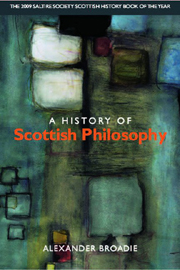Book contents
- Frontmatter
- Contents
- Acknowledgements
- 1 Introduction
- 2 John Duns Scotus
- 3 The Fifteenth Century
- 4 The Circle of John Mair
- 5 Humanism and After
- 6 Scotland Moves into the Age of Enlightenment
- 7 David Hume
- 8 Adam Smith
- 9 The Scottish School of Common Sense Philosophy
- 10 The Nineteenth Century: Ferrier to Seth
- 11 Realism and Idealism: Some Twentieth-century Narratives
- 12 Conclusion
- Bibliography
- Index
9 - The Scottish School of Common Sense Philosophy
Published online by Cambridge University Press: 12 September 2012
- Frontmatter
- Contents
- Acknowledgements
- 1 Introduction
- 2 John Duns Scotus
- 3 The Fifteenth Century
- 4 The Circle of John Mair
- 5 Humanism and After
- 6 Scotland Moves into the Age of Enlightenment
- 7 David Hume
- 8 Adam Smith
- 9 The Scottish School of Common Sense Philosophy
- 10 The Nineteenth Century: Ferrier to Seth
- 11 Realism and Idealism: Some Twentieth-century Narratives
- 12 Conclusion
- Bibliography
- Index
Summary
Section 1: Common sense and its criteria
Famously Hume said of his Treatise of Human Nature: ‘It fell dead-born from the press, without reaching such distinction, as even to excite a murmur among the zealots.’ Yet Reid wrote in the dedication to his Inquiry into the Human Mind on the Principles of Common Sense:
I never thought of calling in question the principles commonly received with regard to the human understanding, until the Treatise of human nature was published, in the year 1739. The ingenious author of that treatise, upon the principles of Locke, who was no sceptic, hath built a system of scepticism, which leaves no ground to believe any one thing rather than its contrary. His reasoning appeared to me to be just: there was therefore a necessity to call in question the principles upon which it was founded, or to admit the conclusion.
Evidently Hume's report on the immediate fate of the Treatise was misleading; indeed once the work was published it was quite difficult to do philosophy in Scotland without an eye on what Hume had said. In 1763 Reid wrote to Hume in these terms:
Your Friendly Adversaries Drs Campbel & Gerard as well as Dr Gregory return their Compliments to you respectfully. A little Philosophical Society here of which all the three are members, is much indebted to you for its Entertainment.… If you write no more in morals politicks or metaphysicks, I am affraid we shall be at a loss for Subjects.
- Type
- Chapter
- Information
- A History of Scottish Philosophy , pp. 235 - 300Publisher: Edinburgh University PressPrint publication year: 2008



